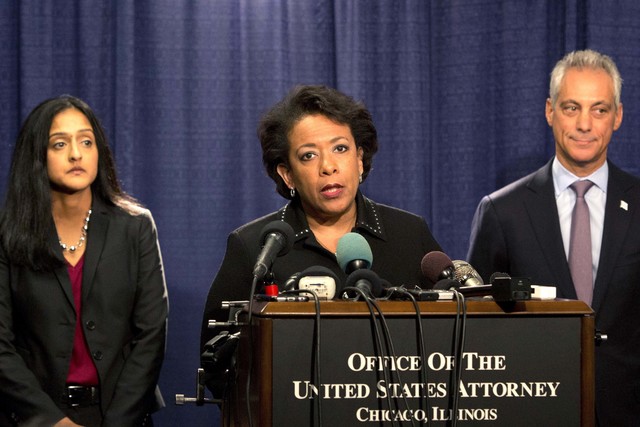Chicago police ‘violated constitutional rights’ for years, Justice Department says

CHICAGO — Chicago police have violated the constitutional rights of residents for years, permitting racial bias against blacks, using excessive force and shooting people who did not pose immediate threats, the Justice Department announced Friday after a yearlong investigation.
Officers endangered civilians, caused avoidable injuries and deaths and eroded community trust that is “the cornerstone of public safety,” said Vanita Gupta, head of the Justice Department’s civil rights division.
The federal report blamed “systemic deficiencies” within the department and the city, including insufficient training and a failure to hold bad officers accountable for misconduct.
The findings come just a week before a change in administration, from a White House that has strongly backed the federal review process to President-elect Donald Trump’s, whose commitment to the system is unclear.
The Justice Department began investigating the nation’s third-largest police force in December 2015 after the release of dashcam video showing a white officer shooting a black teenager named Laquan McDonald, who was hit 16 times as he walked away from police holding a small folded knife. The video of the 2014 shooting, which the city fought to keep secret, inspired large protests and cost the city’s police commissioner his job.
The federal government’s recommendations follow an especially bloody year on Chicago streets. The city logged 762 homicides in 2016, the highest tally in 20 years and more than the combined total of the two largest U.S. cities — New York and Los Angeles.
Mayor Rahm Emanuel said the results of the investigation were “sobering” and pledged to make changes beyond those already adopted. Federal authorities and city officials have signed an agreement that offers a broad outline for reform, including commitments to improved transparency, training and accountability for bad officers. The Justice Department and the city will negotiate a final settlement to be enforced by the courts.
Attorney General Loretta Lynch said the report lays “the groundwork for the difficult but necessary work of building a stronger, safer, and more united Chicago for all who call it home.”
Chicago has spent more than half a billion dollars to settle claims of police misconduct since 2004, but police did not conduct disciplinary investigations in half of those cases, according to the federal report. Of 409 police shootings that happened over a five-year period, police found only two were unjustified.
The Justice Department criticized the city for setting up barriers to getting to the bottom of police misconduct, including provisions in union agreements, a failure to investigate anonymous complaints or those submitted without a supporting affidavit and a “pervasive cover-up culture.”
It said that witnesses and accused officers were frequently never interviewed at all, that evidence went uncollected and that witnesses were routinely coached by union lawyers — “a dynamic neither we nor our law enforcement experts had seen to nearly such an extent in other agencies.”
“The procedures surrounding investigations allow for ample opportunity for collusion among officers and are devoid of any rules prohibiting such coordination,” the report said.
Police used stun guns on people for no other reason than they did not obey officers’ verbal commands, Gupta said, and investigations into misconduct are “glacially slow,” with discipline often “unpredictable and ineffective.”
She also said officers do not get enough support to help them deal with the trauma of their jobs.
Under President Barack Obama, the Justice Department has conducted 25 civil rights investigations of police departments, including in Cleveland, Baltimore and Seattle.
Alabama Sen. Jeff Sessions, Trump’s pick for attorney general, expressed ambivalence at his confirmation hearing this week about the federal review process. He said he was concerned that broad investigations of police departments risk smearing an entire agency and harming officer morale.
The head of Chicago’s police union said the Justice Department hurried the investigation to release its findings before Trump takes office.
In a statement sent minutes before the report was posted online, Fraternal Order of Police President Dean Angelo questioned whether the investigation was compromised because of its timing.
The perception that Emanuel mishandled the McDonald shooting hurt the former Obama chief of staff politically. The mayor said Friday that the city has already made some of the recommended changes, citing de-escalation training and stricter use-of-force polices.
Emanuel also addressed the Justice Department’s concern that officers do not have nearly enough supervision. He pointed to his decision to increase the number of lieutenants and other supervisors.
In assembling the 161-page report, investigators reviewed more than 170 shootings involving officers and more the 425 examples of less lethal force. They also spoke with more than 340 officers and accompanied some on patrol, according to the report.
The Chicago department, with 12,000 officers, has long had a reputation for brutality, particularly in minority communities. The most notorious example was Jon Burge, a commander of a detective unit on the South Side. Burge and his men beat, suffocated and used electric shock for decades starting in the 1970s to get black men to confess to crimes they did not commit.
The McDonald video, which showed officer Jason Van Dyke continuing to shoot the teen even after he slumped to the ground, provoked widespread outrage. It was not until the day the video was released, which was more than a year after the shooting, that Van Dyke was charged with murder. He has pleaded not guilty. Police reports of the shooting later suggested a possible cover-up by other officers who were at the scene.